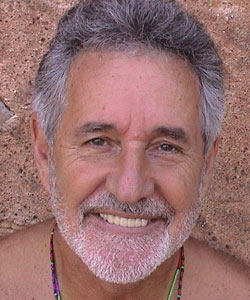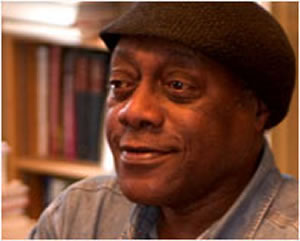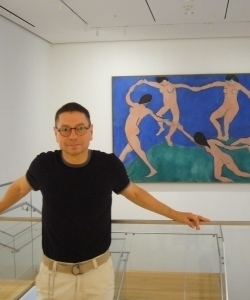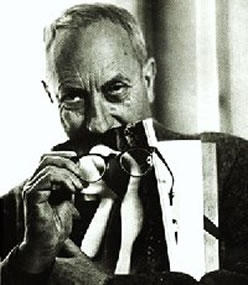|
De Zuid-Afrikaanse schrijver en dichter Breyten Breytenbach werd geboren op 16 september 1936 in Bonnievale. Zie ook mijn blog van 16 september 2006 en ook mijn blog van 16 september 2007 en ook mijn blog van 16 september 2008 en ook mijn blog van 16 september 2009.xml:namespace prefix = o ns = "urn:schemas-microsoft-com:office:office" />
Uit: Intimate Stranger
Poetry is the breath of awareness
However much you feed a wolf, it always looks to the forest. We are all wolves in the dense forest of Eternity. This was written by the Russian poet Marina Tsvetaeva, the man said softly as he stroked the silver fur of the animal crouched in his arms. The animal pricked up its ears, then strained to look back at the dark copse of trees where shadows moved as if alive. As if alive and waiting to move out into the open.
Listen, this process called poetry is an exercise in imagining memory, and then having that memory snare and cherish imagination. Yet, every poem is and will be a capsule of territory in the perpetual present tense, a vessel taking on the ever-changing colors of the sea.
Poetry is the breath of awareness and the breathing thereof. I even mean this literally, for underlying the flow and the fall of verses are natural units of consciousness sculpted by rhythm, by recall, by movement reaching for the edges of meaning and of darkness. One could illustrate by averring that the poem is a membrane, rippling, thrumming; reminding us that we are breathing organisms continually translating the space around us, continually translating ourselves into spaces of the known and thus drawing circumferences around locations of the unknown. From this one could extrapolate that the practice and process of remembering /evoking /awakening events and our selves lead quite naturally to questioning the polarities of other and I, to writing (and un-writing) the self, and toward rewriting the world. The boat changes the water.
Poetry is also the wind of time and thus the movement and singing of being. An old poet friend of mine now coming to the end of his life and cold to dying, the earth lurching under his unsteady tread as he hides his eyes behind tinted glasses to soften the glaring (maybe the gloating) look of Dog Death sniffing closer told me the other day that whatever memory and understanding he has of himself, of the route and the roads traveled, of seas navigated, of big H history, he knows through the resonance of a clutch of poems.

Breyten Breytenbach (Bonnievale, 16 september 1936)
De Amerikaanse schrijver James Alan McPherson werd geboren op 16 september 1943 in Savannah, Georgia. Zie ook mijn blog van 16 september 2009.
Uit: A Loaf of Bread
It was one of those obscene situations, pedestrian to most people, but invested with meaning for a few poor folk whose lives are usually spent outside the imaginations of their fellow citizens. A grocer named Harold Green was caught red-handed selling to one group of people the very same goods he sold at lower prices at similar outlets in better neighborhoods. He had been doing this for many years, and at first he could not understand the outrage heaped upon him. He acted only from habit, he insisted, and had nothing personal against the people whom he served. They were his neighbors. Many of them he had carried on the cuff during hard times. Yet, through some mysterious access to a television station, the poor folk were now empowered to make grand denunciations of the grocer. Green's children now saw their father's business being picketed on the Monday evening news.
No one could question the fact that the grocer had been overcharging the people. On the news even the reporter grimaced distastefully while reading the statistics. His expression said, "It is my job to report the news, but sometimes even I must disassociate myself from it to protect my honor." This, at least, was the impression the grocer's children seemed to bring away from the television. Their father's name had not been mentioned, but there was a close-up of his store with angry black people, and a few outraged whites, marching in groups of three in front of it. There was also a close-up of his name. After seeing this, they were in no mood to watch cartoons. At the dinner table, disturbed by his children's silence, Harold Green felt compelled to say, "I am not a dishonest man." Then he felt ashamed. The children, a boy and his older sister, immediately left the table, leaving Green alone with his wife. "Ruth, I am not dishonest," he repeated to her.
Ruth Green did not say anything. She knew, and her husband did not, that the outraged people had also picketed the school attended by their children. They had threatened to return each day until Green lowered his prices. When they called her at home to report this, she had promised she would talk with him. Since she could not tell him this, she waited for an opening. She looked at her husband across the table.

James Alan McPherson (Savannah, 16 september 1943)
De Amerikaanse schrijver Michael Nava werd geboren op 16 september 1954 in Stockton, Calefornië. Zie ook mijn blog van 16 september 2009.
Uit: How Town
The road to my sister's house snaked through the hills above Oakland, revealing at each curve a brief view of the bay in the glitter of the summer morning. Along the road, houses stood on small woodsy lots. The houses were rather woodsy themselves, of the post and beam school, more like natural outcroppings than structures. Wild roses dimpled the hillsides, small, blowsy flowers stirring faintly in the trail wind of my car. Otherwise, there was no movement. The sky was cloudless, the weather calm and the road ahead of me clear.
Earlier, coming off the Bay bridge I'd taken a wrong turn and found myself in a neighborhood of small pastel houses. Grafitti-gashed walls and a preternatural calm marked it as gang turf. The papers had been full of gang killings that month. When I drove past, a child walking by herself flinched, ready to take cover. None of that was visible from these heights.
This was like living in a garden, I thought, and other associations came to mind: Eden, paradise, a line from "Sunday Morning" that I murmured aloud: "Is there no change in paradise?" I couldn't remember the rest. Elena would know. And she would appreciate the irony. She and I had grown up in a neighborhood called Paradise Slough in a town called Los Robles about an hour's drive from here.
There had been little about our childhood that could be described as paradisiacal. Our alcoholic father was either brutal or sullenly withdrawn. Our mother retaliated with religious fanaticism. As she knelt before plaster images of saints, in the flicker of votive candles, her furious mutter was more like invective than prayer. Their manias kept my parents quite busy, and Elena and I were more or less left to raise ourselves.

Michael Nava (Stockton, 16 september 1954)
De Frans-Zwitserse kunstenaar, dichter en schrijver Hans (Jean) Arp werd geboren op 16 september 1886 in Straatsburg. Zie ook mijn blog van 16 september 2006. Zie ook mijn blog van 16 september 2008 en ook mijn blog van 16 september 2009.
kaspar ist tot
weh unser guter kaspar ist tot
wer trägt nun die brennende fahne im wolkenzopf verborgen täglich zum schwarzen schnippchen schlagen
wer dreht nun die kaffeemühle im urfass
wer lockt nun das idyllische reh aus der versteinerten tüte
wer verwirrt nun auf dem meere die schiffe mit der anrede parapluie und die winde mit dem zuruf bienenvater ozonspindel euer hochwohlgeboren
weh weh weh unser guter kaspar ist tot. heiliger bimbam kaspar ist tot.
die heufische klappern herzzerreissend vor leid in den glockenscheunen wenn man seinen vornamen ausspricht. darum seufze ich weiter seinen familiennamen kaspar kaspar kaspar.
warum hast du uns verlassen. in welche gestalt ist nun deine schöne grosse seele gewandert. bis du ein stern geworden oder eine kette aus wasser an einem heissen wirbelwind oder ein euter aus schwarzem licht oder ein durchsichtiger ziegel an der stöhnenden trommel des felsigen wesens.
jetzt vertrocknen unsere scheitel und sohlen und die feen liegen halbverkohlt auf dem scheiterhaufen.
jetzt donnert hinter der sonne die schwarze kegelbahn und keiner zieht mehr die kompasse und die räder der schiebkarren auf.
wer isst nun mit der phosphoreszierenden ratte am einsamen barfüssigen tisch.
wer verjagt nun den sirokkoko teufel wenn er die pferde verführen will.
wer erklärt uns die monogramme in den sternen
seine büste wird die kamine aller wahrhaft edlen menschen zieren doch das ist kein trost und schnupftabak für einen totenkopf.

Hans Arp (16 september 1886 - 7 juni 1966)
Zie voor nog meer schrijvers van de 16e september ook mijn vorige blog van vandaag.
|



